I Dig Sports
Drugs test exposure sealed Alex Hales' fate - Ashley Giles
Published in
Cricket
Thursday, 02 May 2019 10:02
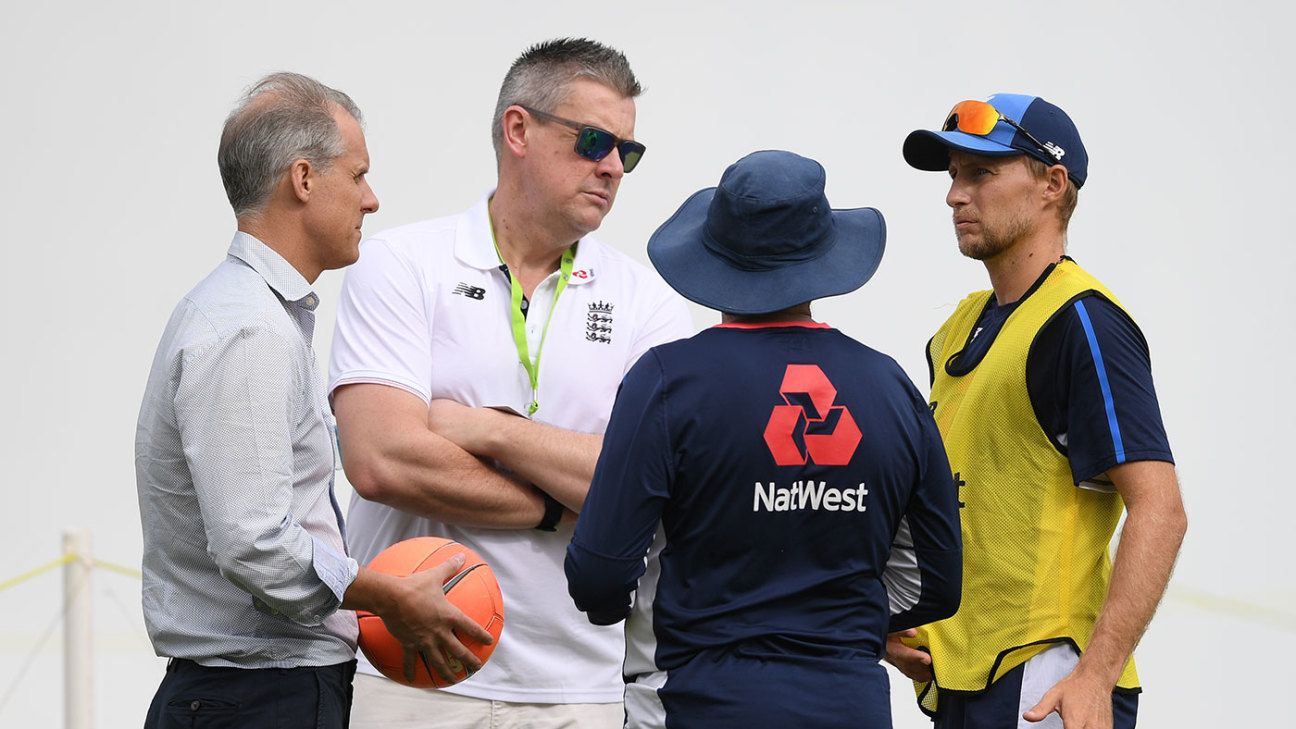
Ashley Giles has accepted that Alex Hales would still be in England's World Cup squad if news of his drugs test failures had not been revealed by the media.
But Giles, the England men's team director, has also insisted that Hales has not been "deselected" as a direct result of that indiscretion. Instead, according to Giles, Hales was axed from England's World Cup plans because of "a string of poor behaviour over time" and "the effect the [latest] news had on the players, the management and the captain".
Giles also confirmed that, while he was aware of Hales' second drug test failure before the selection of England's provisional 15-man World Cup squad - only Giles, Tom Harrison (the ECB's CEO) and Nick Peirce (the ECB's chief medical officer) were informed among ECB officials - he had not passed on the information to the selectors as he was "bound by a duty of confidentiality".
"When the teams were selected, the selectors and the captain were unaware of any issue surrounding Alex," Giles said. "The advice we got from our legal guys was categorically we had a duty of confidentiality which we stuck to. We couldn't tell them, simple as that.
"But once the story broke on Friday, the effect of it on the England environment - on the players, management and captain - was really strong. We're building towards our biggest summer of cricket in 40-50 years and our responsibility is to making sure we're in the best possible shape going into the World Cup. This became too big a distraction for our environment to have."
Speaking candidly on Thursday afternoon, England's captain Eoin Morgan confirmed that he and the team's senior players - Joe Root, Jos Buttler, Ben Stokes, Moeen Ali and Chris Woakes - had reached the conclusion that Hales' place in their plans was untenable, due to a "lack of respect for [the team] values, and ... a complete breakdown of trust". Giles subsequently confirmed that he had been asked to take action.
"Being at England's camp in Wales and seeing the effect of that news, it was clear it wasn't going to work," he said. "There's an element of trust in that environment and if that trust is not within the group, that's a problem. I think that's what occurred here. It could be seen that a string of poor behaviour over time has led us to this point.
"There was consultation. The captain consulted with his senior players and I talked to the captain and the coach. I'm not a selector, but the selectors were unanimous in this decision, fully supported by myself and Tom Harrison that this was the right way to go."
While Giles was adamant the door had not been permanently closed on Hales' England aspirations, he did confirm the player "had some making up to do".
"Alex has been an important part of this team's journey over a period," he said. "The door isn't closed, whatever people think.
"What we want to see is some really good behaviour over time and some good cricket, of course. We're there to support him. I understand he's going back to play for Notts but it's important we have support from all corners, whether it be the PCA, the ECB or Notts. The player's welfare is still fundamental. But there's some making up to do, I'm sure."
Giles seemed particularly underwhelmed by the statement from Hales' management team which suggested that previous assurances from Giles that Hales' World Cup place would not be affected were "rendered meaningless" by the subsequent decision to 'deselect' him.
"I didn't think that statement was particularly good, but he's clearly disappointed and we get that," Giles said. "We - Tom Harrison and I - kept our part of the bargain and maintained our integrity throughout this. Someone else clearly didn't. That's the problem.
"We said no off-the-field incident could have a bearing on World Cup selection. We stand by that. Any process, whether it be discipline or otherwise, you can't have double jeopardy.
"At the same time, Tom and I can't make guarantees on selection because we're not selectors. That's not handing over responsibility, but we assured him in this case that, for this off-the-field incident, it could not have a bearing on World Cup selection.
"But once the story broke, the effect was really strong. It was too big a distraction for our environment to have. So yes, of course, had the story not been made public, the environment would not have been affected and he could have stayed in the side."
Giles also confirmed that England's policies on the issue of recreational drugs may need to change. While he accepted the current guidelines had been put in place to avoid a recurrence of the Tom Maynard tragedy in 2012 - many felt Maynard may not have attempted a desperate escape from the police if he was less fearful of the repercussions to his career of a potential drugs test failure - he conceded they required reviewing in light of the Hales case.
"The worst thing we could do is bury our heads in the sand and go, let's hope this doesn't happen again," Giles said. "If policies need reviewing, that's what we have to do to make sure next time things work much smoother.
"Let's remember why it was put in place. That policy was put in place after the Tom Maynard situation, a terrible situation, where if we had something like this in place, maybe that could have been avoided. But whether it operates right or not, that's what needs review."
Tagged under
Cricket South Africa evaluating Rabada's back niggle
Published in
Cricket
Thursday, 02 May 2019 10:02
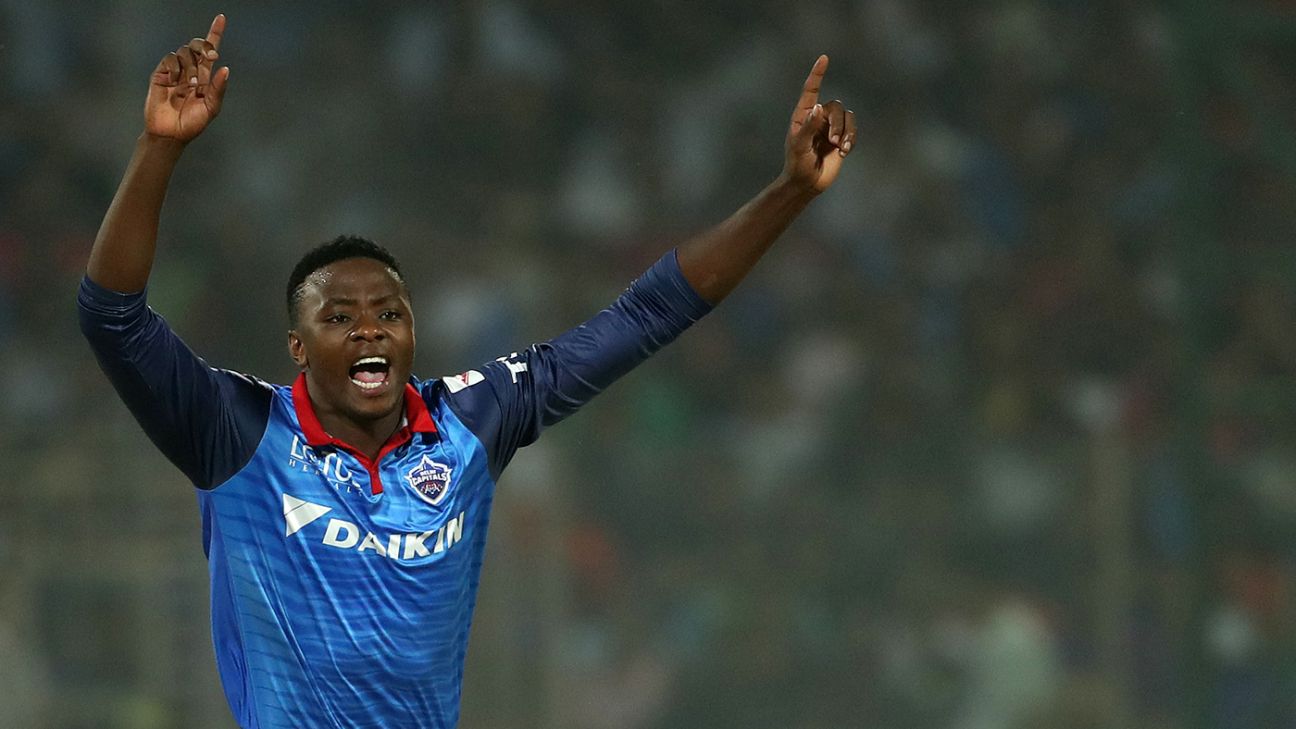
South Africa's injury worries continue to mount with Kagiso Rabada undergoing a scan for a back niggle a day after being rested from Delhi Capitals' league fixture against Chennai Super Kings on Wednesday.
Rabada has topped the wicket charts in IPL 2019, and has been pivotal in Capitals' march to their first playoffs since 2012.
He had complained about some discomfort after his most-recent outing against Royal Challengers Bangalore on Sunday. On Thursday, Cricket South Africa confirmed to ESPNcricinfo that the scans done on Rabada's back had been shared by the franchise, and their medical team was contemplating the next course of action.
With South Africa's World Cup opener against England exactly four weeks away, a serious injury to the leader of their attack could seriously hamper their preparations. South Africa are already dealing with multiple niggles in their squad. They are also anxiously awaiting further news of the prognosis for Dale Steyn, who pulled out of Royal Challengers Bangalore's IPL campaign a week ago after his right shoulder flared up.
Should Rabada need a spell on the sidelines to deal with an injury, South Africa will go into the World Cup with virtually every member of their bowling attack - bar the 40 year old Imran Tahir - on the mend from recent injuries.
Having missed much of the home summer with ligament damage in his knee, Lungi Ngidi picked up a side strain during the fifth ODI against Sri Lanka in March, while Anrich Nortje strained his shoulder in the same game, meaning he was unable to take up a contract with Kolkata Knight Riders. Tabraiz Shamsi has also been rested from the ongoing CSA T20 Challenge in order to fully recover from some stiffness in his back.
Both Ngidi and Nortje have since returned to competitive action, bowling a controlled number of overs against the visiting Afghanistan Academy side last week. But it is not yet fully clear when Steyn might be fully fit. With South Africa's pre-World Cup camp starting in 10 days, an injury to Rabada could complicate things even further.
Tagged under
Hill's lawyer details abuse denial in letter to NFL
Published in
Breaking News
Thursday, 02 May 2019 10:51
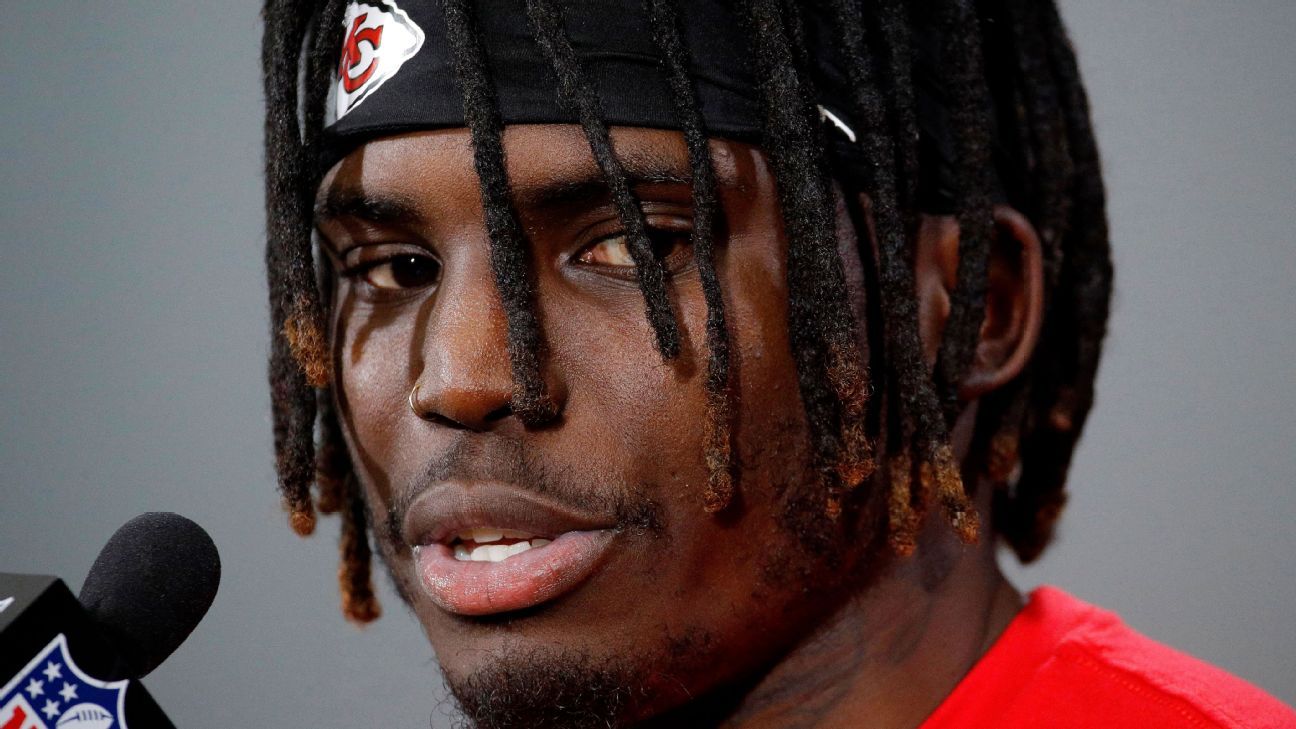
The attorney for Tyreek Hill issued a detailed denial of child abuse allegations made against the Kansas City Chiefs wide receiver in a recording that was released last week while also accusing Hill's fiancée of abusing their 3-year-old son.
In a four-page letter sent to the NFL on Thursday, a copy of which was obtained by ESPN, attorney N. Trey Pettlon went through the key accusations made by Hill's fiancée, Crystal Espinal, in a recording she secretly made and that was broadcast April 25 by KCTV in Kansas City.
In the recording, Espinal says, "He kept saying 'Daddy punches me,' which you do when he starts crying. What do you do? You make him open up his arms, and you punch him in the chest." Pettlon addresses that accusation, writing there have been times when Hill has tapped his son on the chest and told him to "man up, buddy" or "don't cry, my man" while denying grabbing his son's arms as part of physical discipline.
"He (Hill) categorically denies he has ever 'punched' his son in the chest or anywhere on his body, or otherwise touched him in the chest in a mean-spirited manner or as a form of discipline," Pettlon wrote.
Pettlon denied Hill played any role in breaking their son's arm. The attorney notes the boy was examined at the hospital and the injury was considered an accident.
Hill also denies Espinal's assertion that their son is "terrified" of him, with Pettlon adding that this was a claim he was hearing from Espinal for the first time. Pettlon addressed Hill's response from the audio, in which the wide receiver tells Espinal "You need to be terrified of me, too, b----," and write that Hill's comment was "inexcusable."
The letter confirms the recording is of Hill and Espinal. Following the release of the audio, Hill was barred indefinitely from all team activities by the Chiefs.
Pettlon also cites text messages between Hill and Espinal, claiming Espinal admitted to leaving marks on their son while spanking him.
Chiefs owner Clark Hunt said Saturday that the team is conducting an internal investigation into the matter, and Johnson County District Attorney Steve Howe, who declined to press charges a day before the audiotape surfaced, has reopened the case.
Hill is willing to meet with NFL investigators, Pettlon said, and will cooperate with the investigation "to the extent that he can under the law."
ESPN's Adam Schefter contributed to this report.
Tagged under
Lowe: How philosophical differences define the Rockets-Warriors series
Published in
Basketball
Thursday, 02 May 2019 09:48
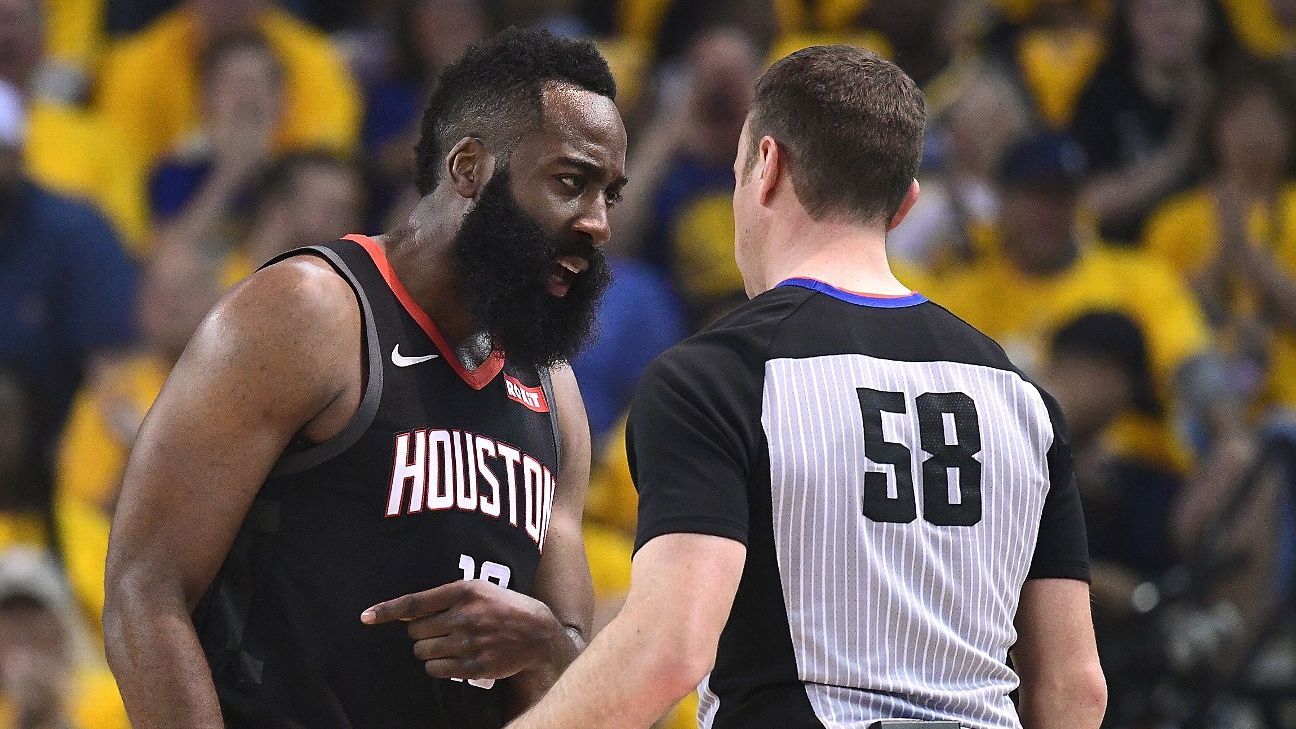
Only two-plus weeks ago, Stephen Curry coaxed Montrezl Harrell into the air on a mean pump-fake with the Golden State Warriors down by two in Game 2 of their Western Conference first-round series against the LA Clippers. For a fleeting moment, Curry, a 90 percent career free throw shooter, had an easy path to three free throws: leap into Harrell, airborne and helpless, for a shooting foul.
Curry demurred. He let Harrell fly by, pivoted to his left, and launched an open 3-pointer to give Golden State the lead. He missed. The Warriors lost.
Curry drew some criticism, including across ESPN television the next day, for not flinging his body into Harrell. A lot of those same people might also lament James Harden's occasional abandonment of normal basketball movement patterns in an effort to create contact -- including the jackknifing of his legs on step-back 3-pointers that have thrust "landing space" into the NBA vernacular and spawned a public officiating controversy. Those two acts -- a shooter in Curry's position leaping sideways into an airborne defender, Harden extending his legs -- aren't quite the same thing, but they are cousins.
It would have been interesting to have a candid discussion with Golden State's coaches after that Clippers game about Curry's decision. On some level, they probably wished he had taken the free throws.
For years, Golden State's coaches have tried to convince Curry and Klay Thompson to leverage the fear of their shooting ability -- and the connected power of their pump-fakes -- into easy points. Steve Kerr once froze the video during a film session to highlight a moment when Curry might have been able to draw contact using a pump-fake, Bruce Fraser, a Warriors assistant coach, told ESPN last season. "Teams run at [Curry] like they are scared to death of his shooting," Fraser said then.
Kerr even cued up tape of Mahmoud Abdul-Rauf, master of many fakes, including an extended two-arms-over-head pump-fake that looks almost like a faster version of Chandler Parsons' exaggerated pump-fake today. (Perhaps Kerr has personal memories of Abdul-Rauf lighting up the Bulls for 32 points in a February 1996 Nuggets-Bulls game -- one of only 10 Chicago losses that season.)
Here's Nick Young executing it as the Warriors' bench, knowing the Abdul-Rauf history, goes bananas:
Even if Curry evaded contact, he could still pump-and-drive his way into the paint.
"Everyone is so afraid of him, I'm always trying to get him to pump-fake more," Kerr told ESPN in late 2017. Curry leaned into it for a bit:
Thompson could never bring himself to seek out collisions, Golden State coaches and executives say. He viewed it as gimmicky. Thompson had confidence in his shot. He didn't need free throws.
The Houston Rockets would probably nudge him harder. Part of what makes Golden State-Houston such an irresistible rivalry is that the teams stand as ideological opposites within the deepest recess of their basketball souls. Those philosophical differences are informing the ongoing officiating debate, which will fade -- along with this series -- if Houston does not win both Games 3 and 4 at home.
And it's not a good-versus-evil dichotomy either, though some will frame it that way. It's more old-school versus so-new-school-we-don't-know-quite-what-to-do-with-it. The Warriors are basketball purists almost at their own expense. Curry did not leap into Harrell, after all. Their motto is "strength in numbers." Even in some huge playoff games, Kerr stretches the rotation to its breaking point. He prefers an equal-ish opportunity offense in which everyone screens, cuts, passes and touches the ball.
"Kerrism," as Ethan Strauss has dubbed it at The Athletic, has practical strategic aims. It is not just basketball religion. An extended rotation keeps players fresh. Touching the ball on offense pushes everyone to play harder defense. Moving the ball from side to side forces every opposing defender to expend energy.
And yet: Sometimes it feels a little like dogma. Anderson Varejao plays in Game 7 of the 2016 NBA Finals (never mind that he helped swing Game 7 of the conference finals). The Warriors open the second quarter of a big game with both Curry and Kevin Durant on the bench. Golden State refuses to just give the ball to Curry and Durant, or run endless pick-and-rolls between them, until they reach a crisis moment. Warriors Twitter cracks about "Kumbaya Kerr."
Even as Curry and Thompson revolutionized the entire idea of 3-point shooting, Kerr's Warriors held true to a style in keeping with how basketball has always looked.
The Rockets do not care how anything looks. They care about math. The math says Harden isolating is the most efficient thing they can do, so they do that over and over. The math says Harden isolating into a step-back 3-pointer is the most efficient version of that, so Harden now takes and makes more step-back 3s than anyone attempted in normal 3s until Curry.
They are also at a talent deficit against perhaps the greatest collection of prime star talent ever assembled. They are seeking any edge, and there just aren't many edges beyond Harden creating points in any way possible.
Harden and those "landing space" 3s are at the crux of what Houston alleges as officiating bias against them in head-to-head games against Golden State. As Rachel Nichols and I reported Monday, the Rockets have done extensive math and concluded that incorrect calls and non-calls cost them 18 points last year in Game 7 of the Western Conference finals.
The NBA told ESPN it disputes Houston's methodology. It is right to do so. It's quite Houston-friendly.
The league would not comment further, and it has not yet publicly disputed that total missed calls and non-calls in this matchup have favored Golden State over the past two postseasons.
Sources say such a discrepancy exists. While there have missed calls going both ways, the discrepancy has amounted to approximately three additional, definitive missed calls per game that have disadvantaged the Rockets. That does not include gray area uncalled "potential infractions" the NBA flags upon enhanced review and deems inconclusive.
(The NBA declined to share any such data, as it is confidential. Also: Such a discrepancy would inevitably exist, to some degree, in any head-to-head series between any two teams -- and could flip in the other direction at any time, given the small sample sizes.)
Here's a thing the NBA has found after years of parsing data about officiating: Even though they earn heaps of free throws, most ball-dominant superstars do not get close to every call they deserve under the letter of the law. Most have a sizable ratio between incorrect non-calls -- those they deserve but don't get -- and undeserved fouls drawn. (Cut to Shaq nodding.)
That is inherent to being a ball-dominant superstar. Some beloved teams -- Pat Riley's Heat, Jerry Sloan's Jazz -- famously defended with nonstop handsy physicality because they knew referees simply could not call every foul. If they did, games would last four hours. Ball-dominant superstars suffer from something like the corollary of that.
A few seasons ago, Harden's foul ratio was likely typical of a ball-dominant superstar -- or something in the upper bound. That ratio likely increased as Harden pushed the boundaries of individual usage and embraced the step-back 3 at such high volumes.
For better or worse, Golden State's egalitarian style mitigates this sort of extreme foul ratio issue with Durant and Curry. (For the record, Kerr has coached with more urgency in these playoffs. He started the Death Lineup from the jump against Houston, and has been more willing to let Curry and especially Durant cook.) Kerr is of course correct that referees miss calls on both in every game, especially on drives. It's just that neither has the ball as much as Harden.
If the Rockets are victims, they are at least somewhat victims of their own math-based modernity -- of their unique dependence on Harden, and his step-back 3.
By the way: Credit Harden for accepting that burden, even if he enjoys it. It is taxing. He is bigger and stronger than Curry, and stouter than Durant. He can absorb more blows.
The refs can't call everything. Some of the calls they miss against Harden -- including a couple in Game 1 of this series -- rob Houston of these newfangled three-shot fouls. A three-shot foul is more profitable than almost any other outcome of an offensive possession. As ESPN's Kirk Goldsberry put it on a podcast this week, a three-shot foul on Harden produces more points on average than an uncontested Giannis Antetokounmpo dunk.
Those potential fouls, at least the way Harden produces them, are more or less brand new to basketball. What even is a "landing space"? How far does it extend? How far can Harden jump forward? How far does any human need to jump forward -- to use his legs for extra power -- on step-back triples almost no one was even taking five years ago? How far forward does Harden's defender get to jump? One Western Conference team instructed its players not to jump forward at all against Harden's step-back, per sources with that team -- to stand still and raise their arms up.
Jay Williams on ESPN's Get Up! this week literally laid two strips of masking tape on the floor and hopped between them, like an overgrown bunny, to illustrate what was and was not an appropriate leap forward on jumpers.
If we are reduced to that sort of granular analysis -- in slow motion, in pristine studio environments -- what are referees supposed to do during live games?
Some calls are obvious. Thompson violently invaded Harden's landing space on two shots when Harden did not move forward much -- bad missed calls. Harden's leg kick in the direction of Draymond Green on his game-tying attempt in the final seconds of Game 1 was blatant and unnatural ref-bait.
The Warriors bend the rules, too. They just do it in ways that everyone has agreed upon as semi-acceptable parts of basketball culture. They sometimes set moving screens to free shooters. They grab and hold on defense when they can get away with it. And boy howdy, do they complain to referees.
The ways that Houston bends the rules are new and unfamiliar. The Rockets have argued the league's most experienced officials, the ones who comprise most playoff crews, are least likely to award Harden three-shot fouls. Tom Haberstroh of NBC Sports wrote Tuesday that Harden has earned fewer three-shot fouls per game in the playoffs than in the regular season.
Had Curry thrown himself sideways into Harrell, some commentators would have surely argued that he had earned that bit of contrivance with a real basketball play -- a pump-fake. Illegal screens -- a tactic every team uses, but one which the Warriors perhaps use more effectively and to aid much better shooters -- are seen as cooperative acts. They are one teammate helping another. We lionize physical defense.
The league is still grappling with whatever it is Harden is doing on these step-back 3s, let alone the jagged intricacies of his driving game. In contrasting the "pump-and-jump into a defender" play -- the one Curry did not make against Harrell -- with Harden's "landing space" attempts, several coaches and executives offered this distinction: Curry is tricking the opponent; Harden is tricking the referees. One is closer to real basketball.
Those two acts are different. Again: They are cousins, not immediate family. But illegal screens and under-the-radar grabbing and holding could be framed as tricking referees, too.
All of the Rockets' complaints really come down to Harden. They surely know he will get little sympathy. He has led the league in free throw attempts in six of the past seven seasons. He drives and winds up to shoot 3s in some instances more to draw contact than to try to direct the ball into the basket. He has a history of flopping.
The Rockets also missed 27 straight 3s with a chance to make the NBA Finals. Their lack of diversity in style hurt them in that game, hurt them in prior postseasons, and may be hurting them in some vague overarching mathematical way with officials. They may have a right to complain, but they can also adapt.
Tagged under
Trungelliti's 'principled stand' finally backed by integrity unit
Published in
Tennis
Wednesday, 01 May 2019 23:33
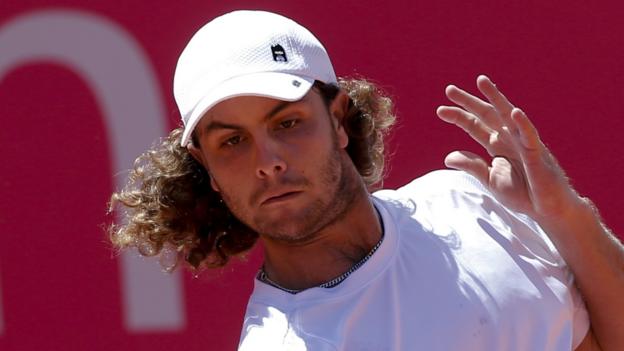
Marco Trungelliti has received support from the Tennis Integrity Unit more than two weeks after complaining of feeling abandoned after blowing the whistle on match-fixing in the sport.
The 29-year-old world number 130 acted as a witness in last year's prosecution of three fellow Argentine players for gambling-related activities.
He said he was criticised for his actions, with his motives questioned.
But the TIU says he acted with "the best interests of the sport" in mind.
"His courageous and principled stand against those who seek to corrupt is to be admired and commended," the organisation added in a statement.
The three tennis players sanctioned former world number 78 Nicolas Kicker, ex-world number 269 Patricio Heras and Federico Coria, whose career-high ranking is 223.
Last June, Kicker was banned for six years, with three of those suspended, while Heras was banned for five years, with two suspended. Coria was banned for eight months, with six months suspended.
Trungelliti, who famously drove all night from Barcelona to Paris to claim a place in the main draw of the 2018 French Open, subsequently found himself shunned by some of his fellow professionals and said he repeatedly asked without success for the TIU to support him.
The TIU explained in their statement why they had not publically defended Trungelliti earlier.
"As part of its confidentiality policy, the TIU's intention is at all times to protect the identity of witnesses, and in line with that has not commented on or confirmed Mr Trungelliti's involvement in these cases," they said.
"However, the TIU understands that Mr Trungelliti has subsequently been subject to strong personal criticism and that his motives for co-operating with the TIU have been questioned.
"The TIU unreservedly condemns the treatment received by Mr Trungelliti and would like to place on record its appreciation of his support and full compliance with the Tennis Anti-Corruption Program."
Tagged under
Returning to duty Nadeen El-Dawlatly aiming for African Games
Published in
Table Tennis
Wednesday, 01 May 2019 12:35

by Olalekan Okusan, ITTF-African Press Officer
Hard work to make comeback but most certainly Nadeen El-Dawlatly is determined.
“I feel that I have so much more to give, a lot of targets in my mind to achieve. My husband and my family are motivating me to come back even stronger. I feel so motivated, it was hard at the beginning but with some fitness training and a lot of practising, it gets better.” Nadeen El-Dawlatly
A daily routine has been established.
“I wake up early morning, go to work then I return to my baby to spend some time with her and later take her with me to practise. I literally missed everything; from the physical pain and muscle soreness to the heavy training and also I missed so much the competitions and representing my country.” Nadeen El-Dawlatly
The African Games is the priority.
“I am doing all I can to be able to be ready for the 2019 African Games in Morocco. The tournament is of course my focus and I mainly focus on getting back to my shape and to be fit again. My husband and my family are doing everything they can for me to get back stronger. They are helping me in every possible way. I am really grateful and I would not do any of this without them.” Nadeen El-Dawlatly
Notably at the 2015 African Games staged in Brazzaville, Nadeen El-Dawlatly was a member of the Egyptian gold medal winning women’s team. In addition she was the women’s singles runner up beaten by colleague Dina Meshref in the final, the player she partnered to runners up spot in the women’s doubles event.
Tagged under
Second round places decided, impressive performance raise eyebrows
Published in
Table Tennis
Wednesday, 01 May 2019 17:32

Contrary to status, first place in the initial stage group was secured; soon after opening round wins were secured.
Anastasiia Beresnova beat England’s Denise Payet (11-6, 11-5, 11-9, 8-11, 5-11, 11-7) to reserve her second round place; similarly Vlada Voronina accounted for Portugal’s Raquel Martins (12-14, 11-4, 11-8, 11-4, 11-1). Meanwhile, in a similar vein Megan Gidney accounted for Spain’s Ana Maria Vertiz (11-7, 9-11, 11-4, 13-11, 3-11, 13-11); Poon Yat ended the hopes of the Czech Republic’s Gabriela Stepanova (10-12, 11-5, 11-6, 8-11, 11-9, 9-11, 11-9).
Somewhat surprise names to appear in round two; not where the very elite are concerned. Germany’s Franziska Schreiner, the top seed, duly finished in first place in her group and thus received a direct entry to the second round, as did Chinese Taipei’s Tsai Yu-Chin, the no.2 seed. In a similar vein the Russian combination of Ekaterina Zironova and Elizabet Abraamian, the respective third and fourth seeds, advanced to round two.
Surprise outcomes in the junior girls’ singles event; in the junior girls’ doubles, there was one casualty of note. The no.4 seeds, the combination of Brazil’s Giulia Takahashi and Laura Tiefenbrunner, experienced a narrow second round defeat at the hands of Chinese Taipei’s Chen Tsai-Nai and Liu Ru-Yun (11-8, 5-11, 9-11, 11-5, 11-9).
Problems for the fourth seeds, there were no such difficulties for the remaining leading pairs. Elizabet Abraamian and Ekaterina Zironova, the top seeds, duly progressed to the quarter-final round as did Franziska Schreiner in partnership with colleague Anastasia Bondareva. Likewise, the Tsai Yu-Chin in in harness with compatriot Huang Yu-Jie, the no.3 seeds, duly progressed.
The junior girls’ singles and junior girls’ doubles events will be played to a conclusion on Thursday 2nd May.
Tagged under

In the opening round, Guillaume Alcayde beat Croatia’s Lovro Zovko (11-8, 11-6, 7-11, 11-1, 8-11, 9-11, 11-1), Iker Gonzalez accounted for England’s Ethan Walsh (11-9, 11-7, 11-9, 11-9).
Likewise, Huang Yan-Cheng overcame the Czech Republic’s Radim Bako (11-6, 11-9, 11-7, 8-11, 7-11, 11-7), Dominic Jonack ended the hopes of Austria’s Fabian Fritz (11-8, 11-9, 11-9, 12-10). Meanwhile for Vladislav Makarov, he experienced the easiest journey of all; he received a direct entry to the second round.
Surprise names to progress to round two; there were surprise names to fall in round one. Spain’s Marc Gutierrez, the no.9 seed, was beaten by Frenchman Jukes Cavaille (11-5, 11-7, 11-8, 11-6), Hungary’s Oliver Both, the no.10 seed, lost to Russia’s Nikita Moshkov (10-12, 11-5, 11-7, 11-6, 11-5).
Similarly, Portugal’s Samuel da Silva and Goncalo Gomez experienced unexpected defeats. Samuel da Silva, the no.13 seed, suffered at the hands of the Czech Republic’s Radek Skala (10-12, 11-9, 12-10, 9-11, 11-8, 7-11, 11-9), asdid Goncalo Gomez, the no.14 seed, when facing Peru’s Carlos Fernandez (11-8, 13-11, 11-9, 9-11, 8-11, 6-11, 11-9). Defeat for four seeds and there was defeat for one more; Canada’s Terence Yeung, the no.15 seed, was beaten by Russia’s Sergey Ryzhov (11-7, 12-14, 17-15, 11-9, 11-9).
Upsets in the junior boys’ singles event; in the junior boys’ doubles there were even greater surprises.
Germany’s Hannes Hoermann and Kay Stumper, the no.2 seeds, experienced a third round exit. They were beaten by the French pairing formed by Jules Cavaille and Denis Dorescu (11-9, 7-11, 8-11, 11-9, 11-7). A third round departure for Hannes Hoermann and Kay Stumper; for Spain’s Marc Gutierrez and Alberto Lillo, the no.4 seeds, it was farewell one round earlier. They lost Germany’s Dominik Jonack and Tom Mykietyn (11-8, 11-7, 9-11, 11-8), who then promptly suffered against the French pairing of Alex Lebrun and Fabio Rakotoarimana (8-11, 11-8, 11-9, 11-9).
Problems, not for the combination of Brazil’s Guilherme Teodoro and Moldova’s Vladislav Ursu, the top seeds, nor for Hungary’s Csaba Andras and Oliver Both, the no.3 seeds; both pairs reserved quarter-final places.
The junior boys’ singles and junior boys’ doubles events conclude on Thursday 2nd May.
Tagged under
Qualification update day two: Seamaster 2019 ITTF Challenge Serbia Open
Published in
Table Tennis
Thursday, 02 May 2019 05:47

Nigerians excels
Nigeria’s Ismalia Akindiya and Olajide Omotayo raised the eyebrows in the opening preliminary round; they beat Hong Kong’s Kwan Man Ho and Li Hon Ming by the minimal two point margin in the decider (5-11, 11-9, 7-11, 11-9, 11-9).
A close call, it was the same for Japan’s Yuki Matsuyama and Masaki Takami; they needed the full five games to overcome Russia’s Ilya Isakov and Aleksandr Tuitiumov (16-14, 5-11, 6-11, 17-15, 11-6).
Latin Americans hold nerve
Argentina’s Gaston Alto in harness with Chile’s Nicolas Burgos maintained their nerve in the opening preliminary round, as did the latter’s colleagues Gustavo Gomez and Juan Lamadrid.
Gaston Alto and Nicolas Burgos withstood a spirited recovery by India’s Birdie Boro and Snehit Suravajjula to emerge successful by the very narrowest of margins (11-8, 13-11, 13-15, 9-11, 12-10); in a equally tense contest Gustavo Gomez and Juan Lamadrid accounted for Sweden’s Fabian Akerstrom and Willhelm Percan Kindblad (11-8, 8-11, 11-7, 8-11, 11-9).
Vital second places
Players finishing in first and second positions in each group advanced to the main draw; the host nation’s Tijana Jokic, Croatia’s Hana Arapovic and Italy’s Li Hong Loan started play as the lowest ranked in their respective groups; they needed to win their concluding matches to secure the vital runners up spot.
All succeeded; Tijana Jokic beat Kazakhstan’s Gulchekhra Khusseinova (11-3, 11-5, 11-5), Hana Arapovic accounted for Slovakia’s Ema Labosova (11-6, 11-7, 12-14, 11-3); Le Thi Hong Loan ended the hopes of Anelia Lupulesku, like Tijana Jokic from Serbia (8-11, 11-9, 11-5, 5-11, 11-6).
Notable efforts secure top spots
Contrary to expectations India’s Krittwika Roy ended the initial phase matches in first place in her group; she concluded matters by beating Croatia’s Andrea Pavlovic (11-9, 6-11, 11-5, 12-10). Notably the finish was one step higher than her status predicted. However, she was not the only player who commenced as the second highest in the group phase to reserve top spot.
Hong Kong’s Zhang Wenling performed likewise, as did Russia’s Kristina Kazantseva and Anna Bikbaeva alongside Serbia’s Monika Knezevic and Aneta Maksuti.
In their concluding group contests, Zhang Wenling beat Spain’s Mariana Niguez (11-4, 11-2, 11-7), Kristina Kazantseva accounted for Kazakhstan’s Aisu Saparova (11-5, 11-2, 11-6); Anna Bikbaeva defeated Serbia’s Ivana Vejnovic (8-11, 11-8, 12-10, 11-4). Likewise Monika Knezevic prevailed against Slovenia’s Ana Tofant (7-11, 11-8, 10-12, 11-9, 11-3), Aneta Maksuti succeeded in opposition to Japan’s Moe Nomura (11-8, 11-9, 12-10).
From third to first
Leili Mostafavi of France alongside the host nation’s Monika Knezevic and Japan’s Ari Abe started proceedings as the lowest rated players in their respective groups; all remained unbeaten to finish in first places.
In their concluding initial phase contests, Leili Mostafavi beat Spain’s Ana Garcia (11-5, 13-15, 11-9, 13-11), Monika Knezevic accounted for Slovenia’s Ana Tofant (7-11, 11-8, 10-12, 11-9, 11-3); Airi Abe over the host nation’s Andjela Menger (11-5, 11-5, 11-4).
Imposing performances
Unbeaten to date, as the initial phase matches concluded, a series of determined performances saw wins recorded against the highest rated players in their respective groups to secure top spots and main draw reservations.
Germany’s Nils Hohmeier beat Hong Kong’s Li Hon Ming (11-6, 7-11, 11-6, 8-11, 11-7), Frenchman Jules Rolland overcame Canada’s Marco Medjugorac. Meanwhile, Kwan Man Ho balanced the books for Hong Kong by ending the hopes Saudi Arabia’s Ali Alkhadrawi (11-6, 12-14, 11-9, 11-9). Similarly, Russia’s Lev Katsman defeated Kazakhstan’s Denis Zholudev (11-6, 13-11, 11-7), Japan’s Kakeru Sone proved too strong for Italy’s Chen Shuainan.
Narrow margins secure first places
Only first place assured progress to the main draw, by the very narrowest of margins Japan’s Shogo Tahara and Slovenia’s Peter Hribar advanced. Furthermore, both beat the highest rated players in their respective groups to maintain their unbeaten records and reserve first places.
Shogo Tahara overcame Argentina’s Gaston Alto (11-13, 11-6, 16-14, 9-11, 12-10), Peter Hribar accounted for Germany’s Gerrit Engemann (11-8, 10-12, 11-6, 4-11, 13-11).
Vildan Gadiev returns to form
Having the previous day lost to Zhang Kai of the United States in five games (11-8, 8-11, 7-11, 11-8, 11-9), Russia’s Vildan Gadiev, the highest ranked player on duty needed an emphatic win to secure first place in his group.
He faced Saudi Arabia’s Abdulaziz Bu Shulaybi, the victor in three straight games (11-5, 27-25, 11-8) in opposition to Zhang Kai in the opening match in the group. Vildan Gadiev responded, he beat Abdulaziz Bu Shulaybi in straight games (11-4, 11-9, 11-2). Thus on games ratio (5:3) he secured first place in the group ahead of Abdulaziz Bu Shulaybi (3:3) and Zhang Kai (3:5).
Qualifiers decided
Leili Mostafavi of France beat Spain’s Ana Garcia (11-3, 14-12, 6-11, 11-8) in her concluding initial phase match; similarly, Russia’s Kristina Kazantseva accounted for Slovakia’s Nikoleta Puchovanova (11-5, 11-7, 11-6) but they were the only two names who started proceedings as the top ranked players in each of the eight groups to finish in first places.
Only the group winners gained main draw places. The previous day Serbia’s Tijana Jokic, Slovakia’s Natalia Grigelova, Croatia’s Hana Arapovic and Japan’s Moe Nomura, all the lowest rated players in their respective groups, had reserved top spots. On the second morning, starting the day the second rated, the host nation’s Sabina Surjan and Croatia’s Andrea Pavlovic followed suit.
Differing fortunes for hosts
Sabina Surjan booked her place in the main draw by upsetting the odds; in her concluding initial stage contest she beat Hungary’s Orsolya Feher (11-13, 11-2, 11-5, 11-9), the highest ranked player in her group to remain unbeaten and reserved top spot.
Alas for colleague, Izabela Lupulesku it was the opposite scenario. The leading name in her group, she was beaten by Croatia’s Andrea Pavlovic (11-7, 11-5, 6-11, 12-10).
Agony for Mudit Dani
India’s Mudit Dani completed his group on a high note; he beat Iran’s Amin Ahmadian in four games (11-7, 4-11, 13-11, 11-8) but it was not sufficient to gain a top two finish and thus progress to the main draw.
On the opening day he had suffered a straight games defeat at the hands of Romania’s Paul Mladin (11-5, 12-10, 14-12), who had then experienced defeat when facing Amin Ahmadian in four games (11-8, 7-11, 11-8, 11-5). Thus on games ratio it was first place for Paul Mladin (4:3) followed by Amin Ahmadian (4:4) and Mudit Dani (3:4).
Surprise first places
Contrary to expectations, Japan’s Shogo Tahara, Canada’s Jeremy Hazin and Russia’s Maxim Chaplygin, alongside Tian Ye of the United States emerged the players to secure first places in their respective groups; all remained unbeaten.
In their concluding matches, Shogo Tahara beat Chile’s Nicolas Burgos (7-11, 11-7, 7-11, 11-8, 11-7), Jeremy Hazin accounted for Serbia’s Dimitrije Levajac (11-9, 11-9, 11-8). Likewise, Maxim Chaplygin overcame England’s Matthew Daish (11-8, 11-9, 11-7), Tian Ye defeated Pero Tepic, like Dimitrije Levajac from the host nation (11-4, 11-3, 11-9).
The consolation for Nicolas Burgos and Dimitrij Levajac was that was their only defeat and thus they finished in second places and advanced to the main draw.
Tagged under
Great Day for Scotland as Top Seeds Seal Semi-final Spots
Published in
Squash
Thursday, 02 May 2019 02:19
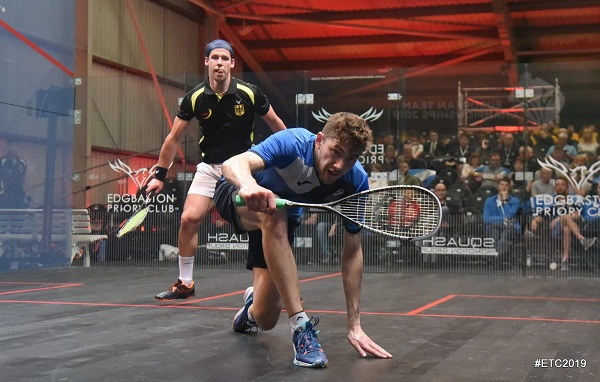
Scottish no. 1 Lisa Aitken (right) celebrates her win v Dutch no. 1 Milou vd Heijden
Scotland the Brave Steal the Show on Day One in Birmingham
By JULIE O’HARE
It was a great day for Scotland as the 2019 European Team Championships got under way at the Edgbaston Priory Club in Birmingham with their men’s and women’s teams both causing upsets that put them within reach of unexpected semi-final places.
In Division One, comprising eight teams in two pools with the top two going through to the semis, all the teams played twice today, with women’s top seeds England and France and men’s top seeds France and England both notching up two wins to all but seal their semi-final places – but defending champions France needed to rely on points countback after Scotland’s Rory Stewart fought back from two-nil down to force a 2-2 draw.
Top seeds and defending champions France eased to an opening Men’s Pool A win 4-0 over Hungary and then had that thrilling draw with the Scots in the second match to secure their last four place. Scotland played 8th seeded Hungary seeking a win that would put them through.
Scotland’s Greg Lobban (right) went toe to toe with Germany’s Simon Roesner, losing 3-1
Fifth seeds Scotland first met fourth seeds Germany – missing their injured number two Raphael Kandra – in a crucial opening encounter on the glass court, and emerged 3-1 winners thanks to victories from Alan Clyne, Rory Stewart and Angus Gillams who took the decisive final match in five games. Then came that thrilling fightback to thwart France.
Joel Makin for Wales was in impressive form v Declan James of England in the battle of the no. 1s
Men’s Pool B went the way of the top seeds as England beat first Switzerland and then Wales – although Joel Makin made the second seeds work for it as he despatched Declan James in the top string match – and third seeds Spain also won twice, setting up a pool decider with England tomorrow.
Tinne Gilis (in yellow) celebrates her win for Belgium on day 1
Women’s Pool B followed a similar pattern, with second and third seeds France and Belgium both notching up wins over Spain and Switzerland – Tinne Gilis the Belgian heroine as she won the deciding match in both encounters – and they’ll meet tomorrow, effectively to see who avoids hot favourites England in the semis.
British National Champion Tesni Evans despatched Sarah-Jane Perry in straight games
The English women didn’t have it all their own way in Pool A though, after a 3-0 win over Scotland they found themselves one-nil down to Wales after Tesni Evans beat Sarah-Jane Perry in straight games. They recovered to win, with Millie Tomlinson, late replacement for the injured Alison Waters winning twice on her European debut.
Edgbaston Priory’s own Millie Tomlinson made a double-winning debut start for England, here v Katriona Allen of Scotland
Scotland went on to shock fourth seeds Netherlands – who had beaten Wales in the opening match – as Lisa Aitken beat Milou van der Heijden 11-9 in the fifth and youngster Georgia Adderley got the better of Tessa ter Sluis in a tense four games.
With England to play the Netherlands and Wales meeting Scotland tomorrow, the semi-final places are still very much up for grabs.
More information, results and photos are available here:
Official website (featuring draws, results, photos and more):
www.edgbastonpriory.com/etc2019
Twitter: https://twitter.com/2019ETC
Facebook: https://www.facebook.com/etc2019
Daily updates via www.thesquashsite.com
Streaming: Watch the action via SquashTV: Facebook and SQUASHTV from 1-4 May
Pictures courtesy of Edgbaston Priory Club
Posted on May 2, 2019
Tagged under











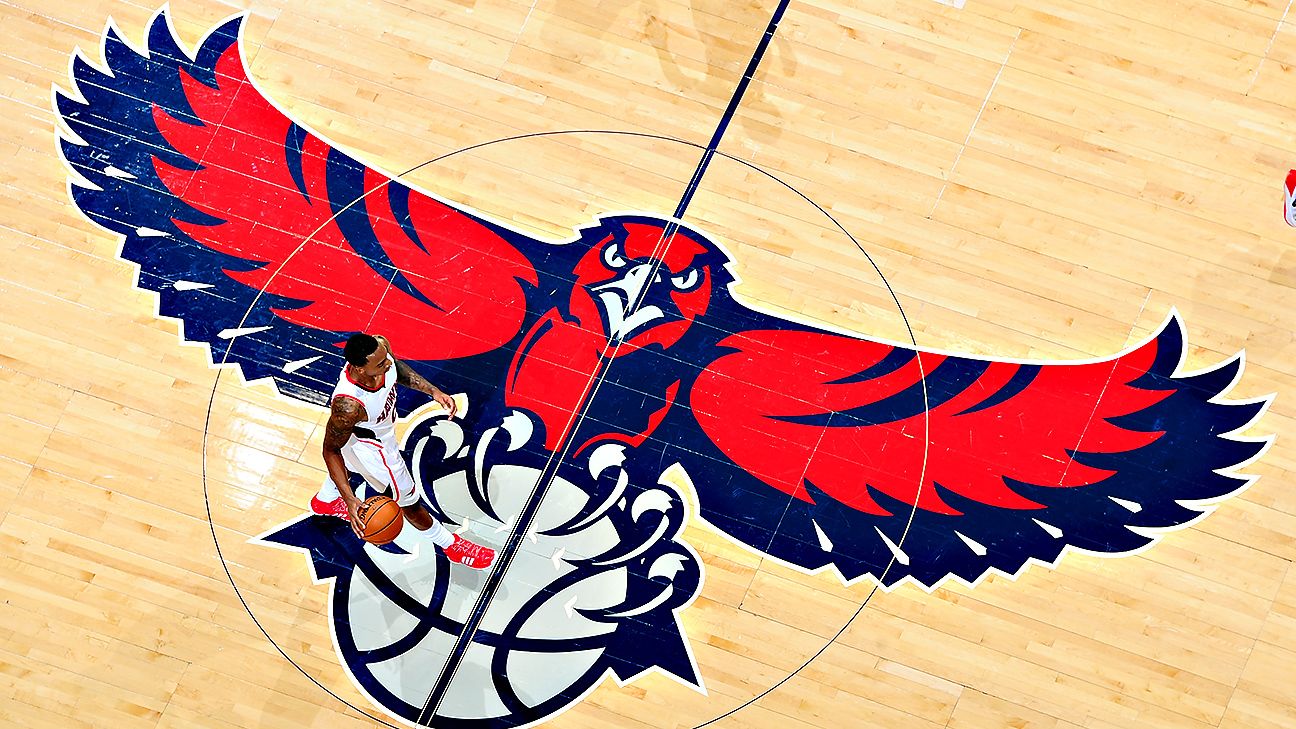



 Phone: (800) 737. 6040
Phone: (800) 737. 6040 Fax: (800) 825 5558
Fax: (800) 825 5558 Website:
Website:  Email:
Email: 






